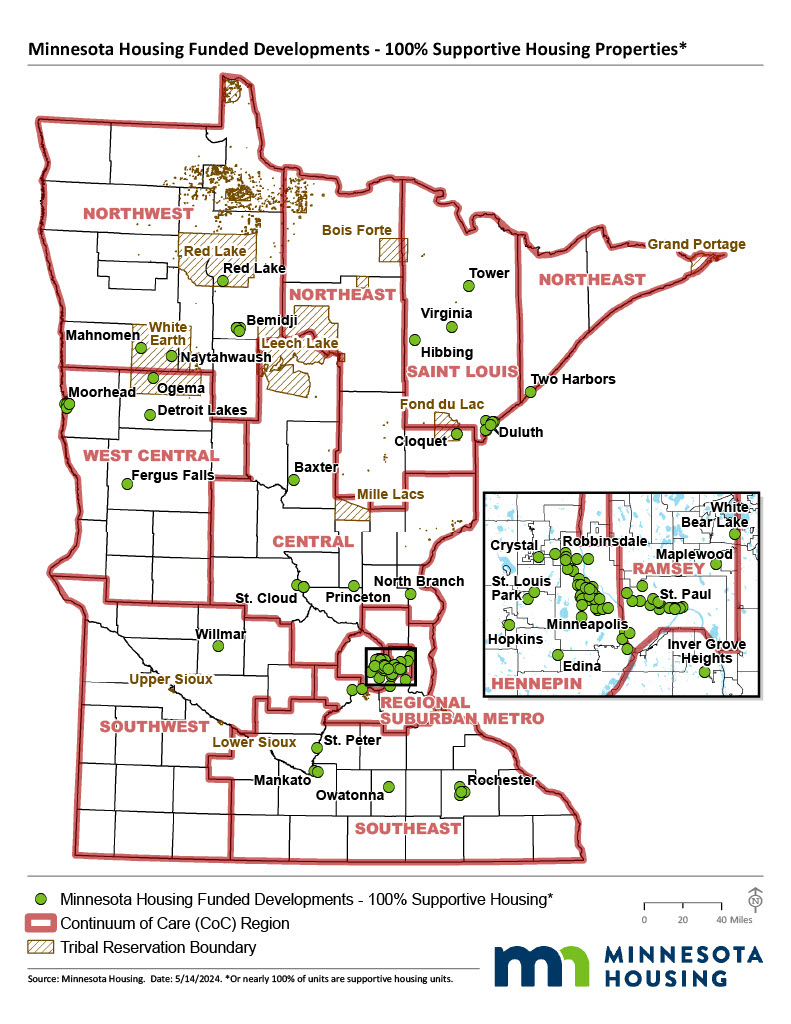
Supportive Housing
Supportive Housing is permanent housing affordable to the people served and provides access to an array of services designed to foster housing stability and improve health and quality of life.
Minnesota Housing offers various capital and rental assistance funding and incentives to create supportive housing units for the highest need households experiencing homelessness and for persons with disabilities.
Information about the application process and resources for capital funding in the annual Multifamily Consolidated RFP is available on the Request for Proposals page. For more specific information about supportive housing requirements, refer to the Supportive Housing Information and Resources, chapters three, four and 12.
Minnesota Housing has funded more than 7,500 supportive housing units in over 400 properties located across the state in the last 20 years. A third of these properties are primarily supportive housing properties.

Updates Regarding the HUD CoC NOFO - Properties with Minnesota Housing Financing
Guidance regarding the Housing and Urban Development (HUD) Continuum of Care (CoC) Notice of Funding Opportunity - Describes how it will relate to Minnesota Housing Financed Projects.
Guidance and Best Practices
Refer to Supportive Housing Information and Resources for guidance on:
- Planning Supportive Housing units
- The Multifamily Consolidated RFP application process
- Post selection due diligence
- Occupancy, reporting and compliance
- Industry best practices
- Funding resources for services and rental assistance
- Definitions
- Other resources
Supportive Housing Eligibility
Supportive Housing units that received points in the Multifamily Consolidated RFP to serve people experiencing homelessness require HPH or LTH eligibility, depending on the year selected for funding. Refer to Chapter 2 in Supportive Housing Information and Resources for more information.
- High-Priority Homeless (HPH): Individuals or families prioritized for Supportive Housing (PSH) through the Coordinated Entry (CE) system.
- Long-Term Homeless (LTH): Individuals or families who lack a permanent place to live continuously for a year or more at least four times in the past three years.
Beginning in 2025, there is a new category for “Other Homeless Units” for projects with HPH units to receive additional points to commit more units to households experiencing homelessness. This category aligns with the eligibility previously required for Housing Infrastructure funding for supportive housing prior to 2024.
- Other Homeless: Includes (i) individuals leaving institutions that do not have a permanent residence or (ii) other homeless populations not referred by the Coordinated Entry System.
Supportive Housing units that receive points to serve people with disabilities (PWD) must serve a person with a disability (any person in the household). Eligibility is defined and documented on the Self-Certification form. Refer to Chapter 12 in Supportive Housing Information and Resources for more information.
Long-Term Homelessness (LTH) Eligibility Materials
- Long-Term Homelessness Eligibility Form
- Homeless Episode Verification Form
- LTH Eligibility Training Module
- Refer to Supportive Housing Information and Resources Appendix C for LTH Eligibility Frequently Asked Questions
High Priority Homeless (HPH) Materials
IMPORTANT UPDATE: High Priority Homeless Eligibility Form Now Available
The High Priority Homeless (HPH) Eligibility Form is now available in HMIS and should be used for all HPH documentation moving forward. Any HPH documentation collected during the interim—using the HPH Eligibility Confirmation Form for Households Not Entered in HMIS or an email from the Coordinated Entry System Priority List Manager confirming a household’s HPH eligibility—does not need to be replaced.Instructions on how to run a report can be found on the HMIS Knowledge Base website.
Post-Selection Materials
In order to close on the financing, applicants selected through the Multifamily Consolidated RFP are required to complete due diligence documentation during the post-selection underwriting process.
Learn more about required documentation for properties with supportive housing units.
Supportive Housing Occupancy
Owners and property managers are advised to recognize that supportive housing units are intended to follow Housing First principles with low-barrier and inclusive access for households experiencing homelessness and persons with disabilities. Learn more about Supportive Housing Occupancy.
Reporting and Compliance Requirements
Minnesota Housing monitors all properties for compliance with funding requirements and legal agreements.
Chapter 11 in Supportive Housing Information and Resources covers the asset management and compliance requirements for developments with Supportive Housing units, including the reporting requirements. More information on monitoring, compliance, reporting and forms can be found on these webpages:
- Oversight and Support for Property Managers
- Documents, Forms and Resources
- A Request for Action (RFA) must be submitted for changes in ownership, management agent, service provider and loan servicing changes.
Homeless Management Information System (HMIS) Reporting Requirement
Minnesota Housing requires owners of occupied properties with Supportive housing units restricted to serve Long-term Homeless (LTH) or High Priority Homeless (HPH) households to enter tenant data into the Homeless Management Information System (HMIS) and submit reports as instructed.
- Requirements are outlined on the HMIS Memo and Contact Form for LTH and HPH Units.
- Find data collection forms on Minnesota's HMIS website.
For questions on Minnesota Housing HMIS requirements, contact mhfa.lth-hmis@state.mn.us.
For questions on the software transition or data entry questions, contact the HMIS Help Desk at mnhmis@icalliances.org.
IMPORTANT UPDATE: HMIS Software Transition and Reporting
The new HMIS system, ClientTrack, launched on August 2, 2024, and ICA has been adding HMIS users in a phased approach. Visit the Go-Live Status Tracker for daily updates. At this time, the LTH/HPH reports for Minnesota Housing and the HPH eligibility confirmation report are not fully functional. Reference this eNews for full details.
Additional Resources
eNews
Meeting invitations are sent on our agency eNews. Be sure to subscribe to the Supportive Housing topic to receive the eNews.
